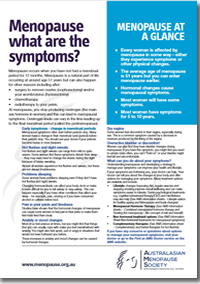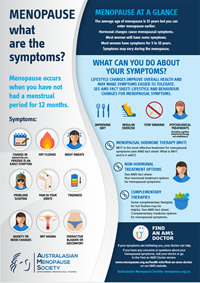Menopause what are the symptoms?

MENOPAUSE AT A GLANCE
- Every woman is affected by menopause in some way – either they experience symptoms or other physical changes.
- The average age of menopause is 51 years but you can enter menopause earlier.
- Hormonal changes cause menopausal symptoms.
- Most women will have some symptoms.
- Most women have symptoms for 5 to 10 years.
Download Fact Sheet ![]() Menopause What are the symptoms72.15 KB
Menopause What are the symptoms72.15 KB
Download Infographic ![]() Menopause What are the symptoms505.50 KB
Menopause What are the symptoms505.50 KB
 Menopause occurs when you have not had a menstrual period for 12 months. Menopause is a natural part of life occurring at around age 51 years but can also happen for other reasons including after:
Menopause occurs when you have not had a menstrual period for 12 months. Menopause is a natural part of life occurring at around age 51 years but can also happen for other reasons including after:
- surgery to remove ovaries (oophorectomy) and/or your womb/uterus (hysterectomy)
- chemotherapy
- radiotherapy to your pelvis.
At menopause, you stop producing oestrogen (the main sex hormone in women) and this can lead to menopausal symptoms. Oestrogen levels can vary in the time leading up to the final menstrual period (called the perimenopause).
Early symptoms - change in menstrual periods
Menopausal symptoms often start before periods stop. Many women have a change in their menstrual cycle (period) before their periods stop. You should see your doctor if your periods become heavy or more frequent.
Hot flushes and night sweats
Hot flushes and night sweats can range from mild to quite severe. Some women find these symptoms disturb their sleep – they may even need to change the sheets during the night because of heavy sweating.
Almost all women experience hot flushes and sweats, but these are not always troublesome.
Problems sleeping
Some women have problems sleeping even if they don’t have hot flushes and night sweats.
Changing hormone levels can affect your body clock or make it more difficult for you to fall asleep or stay asleep. This can happen especially if you have other conditions that affect your sleep – for example, pain, snoring or if you have consumed alcohol or caffeine before bed.
Pain in your joints and tiredness
Studies have shown that the hormonal changes of menopause can cause some women to feel pain in their joints or make them feel more tired than usual.
Anxiety or mood changes
Most of us feel anxious at times, but you might find that things that you can usually cope with make you feel overwhelmed with anxiety. You might also feel upset, sad or angry in situations that
would not have bothered you before.
These increases in anxiety and mood changes can be caused by hormonal changes.
Dry vagina
Some women feel discomfort in their vagina, especially during sex. This is a common symptom caused by a decrease in moisture produced by the lining of the vagina.
Overactive bladder or discomfort
Women can also find they have bladder changes during menopause. If you have this symptom, you might find you need to urinate more often, you can’t “hold on” or your bladder might feel full and uncomfortable.
What can you do about your symptoms?
Understanding menopause and developing a strategy to manage your symptoms can improve your health and lifestyle.
If your symptoms are bothering you, your doctor can help. Your doctor can tell you about the changes in your body and offer options for managing your symptoms. Many treatment options are available and include:
- Lifestyle changes (See AMS fact sheet – Non-hormonal treatment options)
- Menopausal Hormone Therapy
- Non-hormonal treatment options (See AMS fact sheet – Non-hormonal treatment options)
- Complementary therapies
If you have any concerns or questions about options to manage your menopausal symptoms, visit your doctor or go to the Find an AMS Doctor on the AMS website.

NOTE: Medical and scientific information provided and endorsed by the Australasian Menopause Society might not be relevant to an individual’s personal circumstances and should always be discussed with their own healthcare provider. This Information Sheet may contain copyright or otherwise protected material. Reproduction of this Information Sheet by Australasian Menopause Society Members, other health professionals and their patients for clinical practice is permissible. Any other use of this information (hardcopy and electronic versions) must be agreed to and approved by the Australasian Menopause Society.
Content updated April 2017
